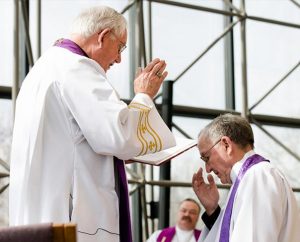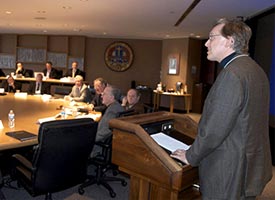By Joe Isenhower Jr.
ST. LOUIS — A March 31 Concordia University System (CUS) think tank with 37 participants at the LCMS International Center here provided “a whole lot to think about,” Synod President Rev. Dr. Matthew C. Harrison told the group at the end of the day.
Harrison’s office convened the gathering to provide input for a task force that will study a number of matters, including issues of confessional Lutheran identity in all CUS institutions.
The 10 LCMS colleges and universities constitute the Concordia University System.

Think-tank attendees included seven members of the CUS Board of Directors, representatives of five CUS institutions (three presidents, as well as faculty, staff and former regents), the two LCMS seminary presidents, pastors, three district presidents, four members of the Synod praesidium, LCMS educators at colleges other than those in the CUS and several Synod staff members.
Delegates to the 2013 LCMS convention adopted Resolution 5-01A (titled “To Encourage Continued Faithful Witness by Concordia University System”) — designed to help the CUS schools retain their “distinctively Lutheran” identity and biblical teachings. The resolution called for the Synod president to form a task force that will make recommendations to the 2016 convention toward that goal.
The resolution also asked each of the 10 schools to develop a strategy for helping students with “unbiblical cultural challenges” on issues such as evolution, sanctity of life, human sexuality and marriage. In addition, it calls for “strengthening all CUS institutions’ connection to the Synod,” “reviewing the composition, size and selection of boards of regents” and reviewing Bylaws and “governance structures” that have to do with the CUS schools.
Twice on the day of the think tank, Harrison cited Matt. 5:13 — once as the session started and again as the text for his sermon at the installation of the Rev. Dr. Dean O. Wenthe as president of the CUS. That verse begins, “You are the salt of the earth, but if the salt has lost its taste, how shall its saltiness be restored?”
In his sermon for the installation, Harrison referred to the 10 CUS schools as “lights in a very dark world.” Noting their strengths, he also spoke of challenges they face, including assaults from an increasingly secular society, their shrinking numbers of LCMS faculty members and students, and isolated cases of instruction that is inconsistent with the Synod’s theology.
“We need somebody who can help us have theological integrity, someone who can bring us together and look at the great strengths we have in the system … so we can do better,” Harrison said. “And we can.”
“You are the right man for this moment,” he told Wenthe, who was installed by LCMS Missouri District President Rev. Dr. Ray Mirly.
Wenthe, retired president of Concordia Theological Seminary, Fort Wayne, Ind., had served as the CUS interim president since October 2013.
Think-tank goals
Wenthe told the think-tank participants that there were three “desired goals” for their being together:
- “To rejoice and give thanks for our Concordia University System schools, to generate new energy and awareness and support for their efforts.”
- “To gain a fresh analysis of what is needed for a university to be excellent academically and at the same time to display clearly and publicly the church’s confession.”
- “We want to think about what we can do that others have done successfully. … Can we become … the Lutheran expression that attracts students and support because of our excellence academically and our deep devotion to the church’s confession?”
Wenthe later told Reporter that he is convinced that the think tank achieved those goals and that the first one “will be further achieved throughout the Synod as the conversation continues and is engaged by all of the stakeholders.”
“I believe that the think tank was a fresh engagement of the issue on how faith relates to reason and demonstrated that this question is posed for every Christian tradition — namely, how a university can combine rigorous academic engagement with a clear and lived-out confession of the faith by its faculty and students,” Wenthe continued. “Reason, without faith, delivers little of lasting meaning. Faith, without reason, is unstable. Together, a ministerial use of reason and clear embrace of the revelation of God in Christ through the prophetic and apostolic Scriptures provide a gracious, beautiful and truthful reading of the human condition.”
“University-level expression of the faith is critical for the health of the church and its mission,” Wenthe said. “By God’s grace, this conversation [at the think tank] will bring greater focus, greater energy and greater support to our Concordia universities — real jewels in the church’s life.”
‘A fresh analysis’
Wenthe introduced the think tank’s main speaker — Dr. Reinhard Hütter — as one who might “give us a fresh analysis.”
Hütter is a professor of Christian Theology at the Duke [University] Divinity School in Durham, N.C., who has written a number of books and articles. One of those articles, titled “Polytechnic Utiliversity” (from the November 2013 issue of First Things) was provided for think-tank participants to read before their gathering. In it, Hütter “argues for putting the universal back in university,” according to a teaser statement under that title.
“The university has morphed into a … community college on steroids, with undergraduate training subdivided into functionalized pre-med, pre-law, pre-engineering training and the ‘salad bar’ consumer curriculum in the humanities,” he writes in that article.
For his think-tank presentation, Hütter stressed that although such education is appropriate for community colleges, too many universities no longer provide a liberal-arts education centered in the concept of a creator, but one that is centered in “the flatness of secular reason.”
“The Christian college and teaching university are uniquely positioned to overcome secular reason’s flatness by connecting reason again to its life-giving roots and by showing through its integrated curriculum how faith perfects reason,” Hütter told the think-tank participants. “By doing precisely this, the Christian college and teaching university will make an indispensable contribution to the Christian intellectual formation of the students and to the overall health of the surrounding culture. If Christian colleges and teaching universities do not pick up this crucial task, in our pervasive secularized culture, very few, if any, other institutions of higher learning will do it.”
Responding to Hütter were two speakers — the Rev. Dr. William Weinrich, professor of Historical Theology and former academic dean at Concordia Theological Seminary, Fort Wayne; and Dr. Kurt Krueger, president of Concordia University, Irvine, Calif., and former CUS president.
Noting that Hütter’s presentation “stands on its own,” Weinrich told the think tank participants that he was “going to talk around it — from my own experience as academic dean.”
He related how the seminary developed its “Theologia” courses that are “intentionally interdisciplinary and integrative,” with God as the true object of theological education, rather than the “four-fold disciplinary structure” of systematic theology, biblical hermeneutics, practical theology and historical theology.
Weinrich said that it was one of Hütter’s books, Suffering Divine Things: Theology as Church Practice, “that proved invaluable to our reflection” in designing that curriculum.
“I hope that one of the outcomes of this meeting is that we really intentionally work together in order to help each other come to a common vision in which we begin to think the thought of that common vision,” Weinrich said.
Krueger said he found Hütter’s presentation “thoughtful and very helpful, especially to those of us affiliated with CUS institutions who attempt to be faithful witnesses to the Gospel of Jesus Christ and follow the teachings of Holy Scripture.”
Krueger addressed several of Hütter’s “observations and suggestions.”
“I think I probably know the Lutheran commitments of all 10 Concordia campuses as well as anyone in this room because of my five years as CUS president, and I can say with confidence that [they] are committed to maintaining the Lutheran identity of their respective institutions,” he said.
Mentioning Hütter’s “tentative remarks about the essential characteristics of a Christian college or teaching university,” Krueger read “a list of essential characteristics of a Lutheran college or university developed by a majority of CUS presidents. We call them Lutheran Identity Standards.”
Hütter later complimented the CUS leaders for developing those standards, which he said he found to be “excellent.”
‘Provocative … points’
Participants identified “more provocative or challenging points” from the think tank, as suggested by its facilitator, Robert “Bob” Gleason.
Those included:
- whether there is common vision for all CUS schools and how Lutheran identity might be defined.
- a perceived lack of unity among them in terms of “worship services” —reflecting what may be a similar lack of unity on worship in the Synod.
- the need for more LCMS faculty members at CUS schools.
- reference to Hütter’s observation that “every person is either a missionary or a mission field,” and what that means for the schools.
- whether distance education is an ally or competitor.
- that where there are “theological inconsistencies” with LCMS doctrine being taught, they need to be addressed and corrected. Harrison pointed out that such cases are isolated rather than being widespread throughout the CUS.
Also at Gleason’s suggestion, think-tank participants identified “strengths of the CUS institutions,” including that:
- CUS campuses provide a welcome to non-Christian students, “which encourages opportunity for the Gospel to permeate.”
- all the Concordias are growing.
- regents are LCMS.
- “we are blessed by committed LCMS faculty and staff that work hard.”
- although there may be difficulties with the understanding of a common confession, “we have a starting point that most other consortia of schools would be jealous of.”
- they present “good deals” for international students who come to CUS campuses where Christ is shared with them, so that “any number of them … carry the Gospel back to the mission field.”
- they remain the main source of preparing church workers.
- they have a strong doctrine of vocation that is shared with students.
- there is willingness to share capacity and provide resources and assistance to one another.
- there are opportunities to acquaint non-Lutheran faculty members with what it means to be Lutheran.
- Synod administrators want to help CUS schools deal with issues.
Capitalizing on strengths
Think-tank participants offered suggestions for how the CUS can “capitalize on its strengths, rather than being absorbed by the larger society,” as Gleason put it. They also discussed online learning, the need for adjustments to weaknesses of LCMS Bylaws pertaining to the CUS, and what Gleason termed the “need to articulate to the rest of the church the crucial value of the CUS to the church.”
At the end of the think tank, Wenthe pointed to the “strong commitment that the Concordia University System has to the church.” He said he is “especially grateful for the church’s leaders who are now so committed to its higher-education institutions.” He thanked Harrison “for this very helpful emphasis.”
“I pray for the CUS schools daily,” Harrison told the think-tank participants at the end of their day together. He thanked Hütter, Weinrich and Krueger for their presentations.
“I am thankful for your time in being here,” Harrison said to all the think-tank participants, as he invited them to continue sharing with him their ideas and observations concerning the CUS schools. “I do believe we are going to get somewhere with all this that will be positive and a great blessing to the church.”
Melanie Ave, a staff writer with LCMS Communications, also provided information for this story.
Posted April 11, 2014 / Updated April 24, 2014

